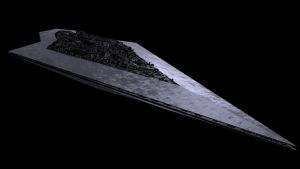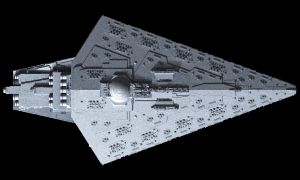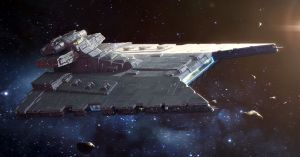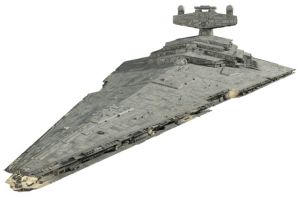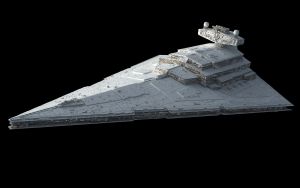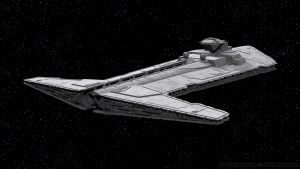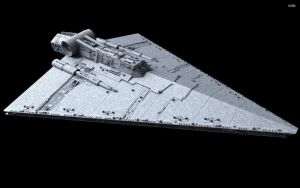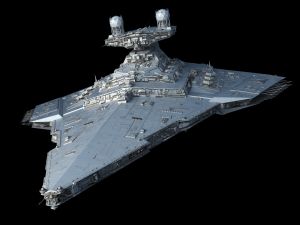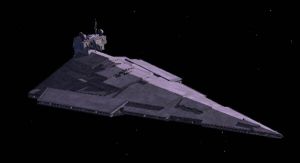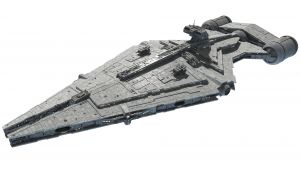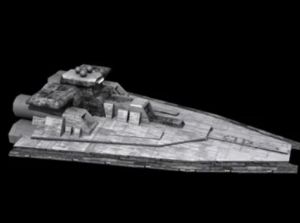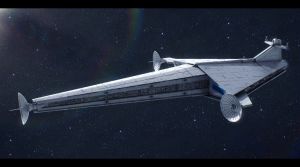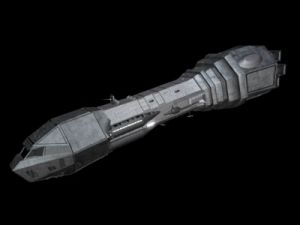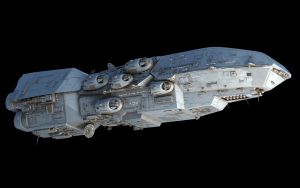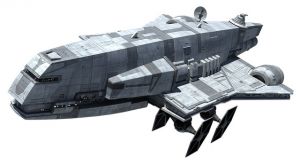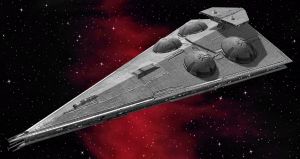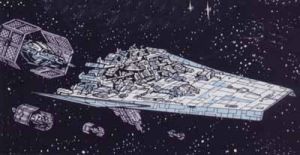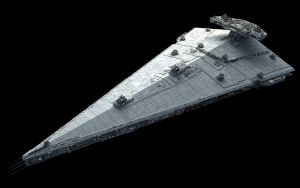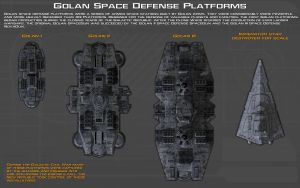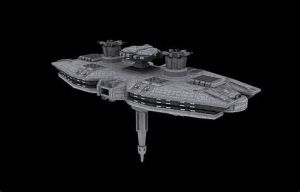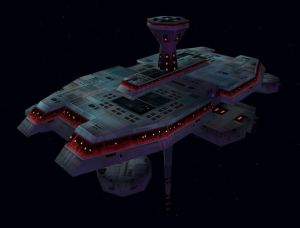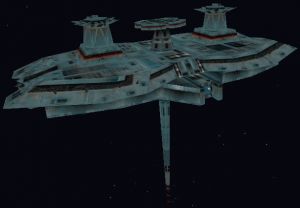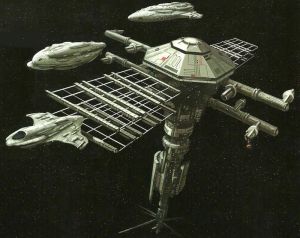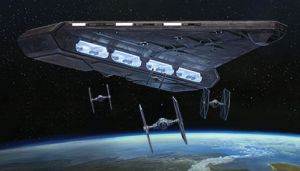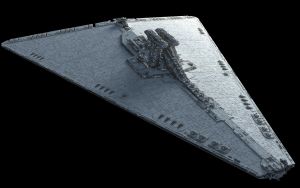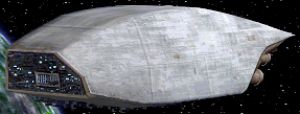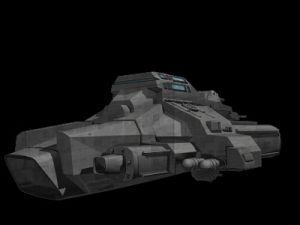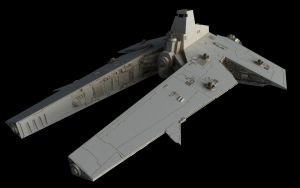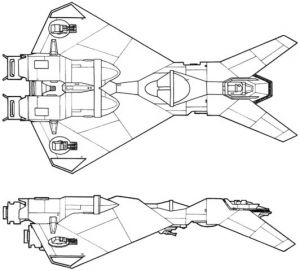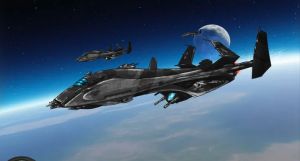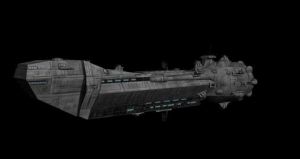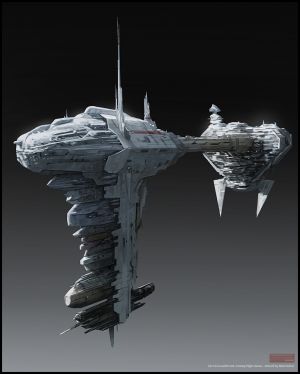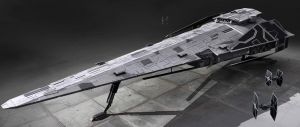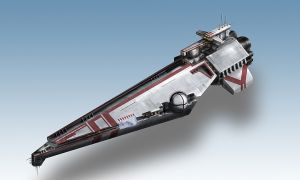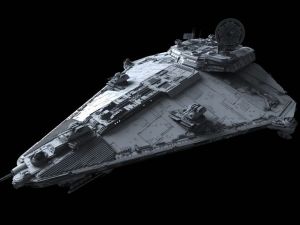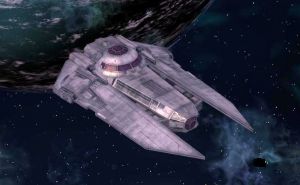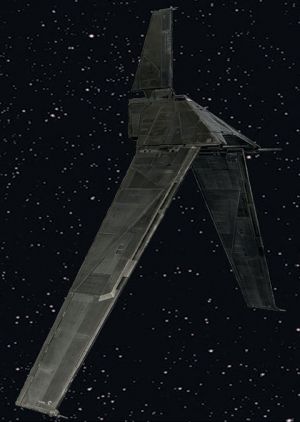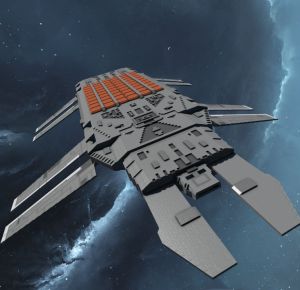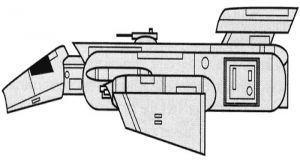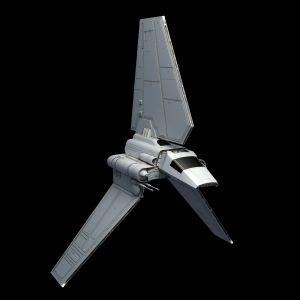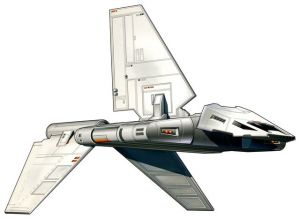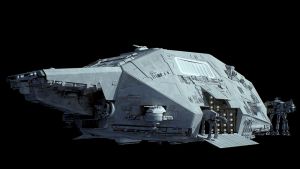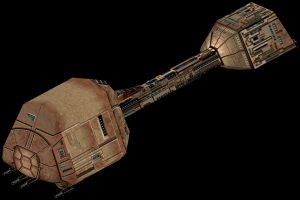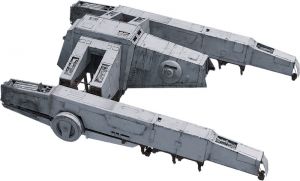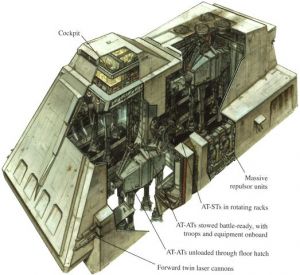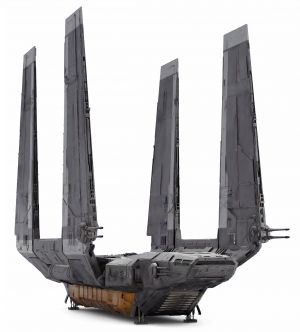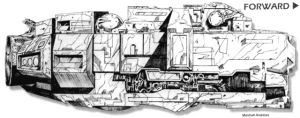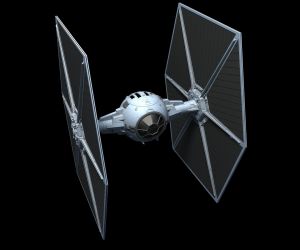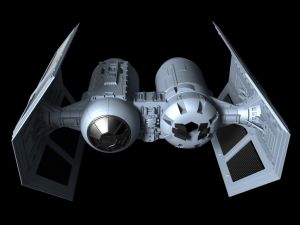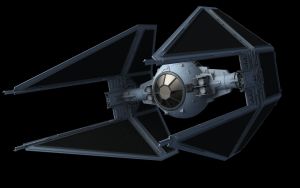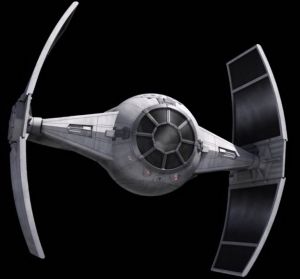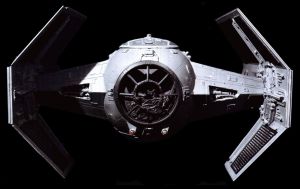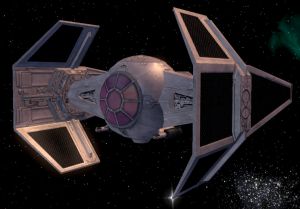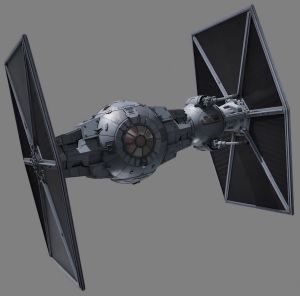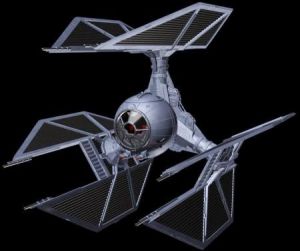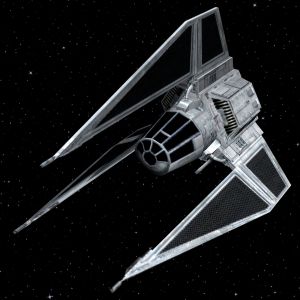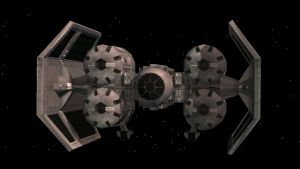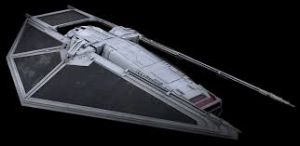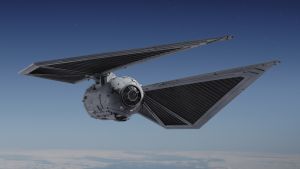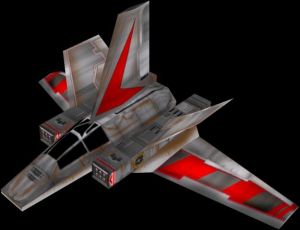Difference between revisions of "Imperial Navy"
| Line 117: | Line 117: | ||
By and large, the Empire prefers mobile weapons of war to the power of a stationary site – even their greatest construction to date, the Death Star, was conspicuously mobile. Still, there are some installations too useful or ubiquitous to pass up. | By and large, the Empire prefers mobile weapons of war to the power of a stationary site – even their greatest construction to date, the Death Star, was conspicuously mobile. Still, there are some installations too useful or ubiquitous to pass up. | ||
{| align="none" border="0" style="background: white" | {| align="none" border="0" style="background: white" | ||
| − | | [[Image:GolanI-station.jpg|center|300px]] || '''Golan I Space Defense Platform'''<br>''Golan Arms''<br>Heavily armed and armored, the Golan I stations are platforms currently used by Imperial forces as customs stations, typically placed in orbit above important worlds or at important hyperlane routes. Though they have been largely replaced by more powerful Golan II and Golan III stations in the Core Worlds area, the Empire still uses them in other, more out of the way locales of some economic or strategic importance.<br>• ''Weapons:'' Fourteen port and fourteen starboard turret-mounted medium turbolasers, three dorsal and two ventral turret-mounted proton torpedo launchers, three port and three starboard heavy tractor beam emitters<br>• ''Complement:'' 24 TIE fighters, 4 patrol boats, 4 shuttles | + | |
| + | |-style="background: gainsboro" | ||
| + | | [[Image:Golan-stations-line.jpg|center|300px]] || '''''Golan'' Line of Space Stations'''<br>''Golan Arms''<br>The three armed space stations utilized by the Empire for defensive purposes provide tactical options and allow a maneuverability to a Navy freed up from having to protect any targets the stations defend. | ||
| + | |||
| + | | [[Image:GolanI-station.jpg|center|300px]] || '''''Golan I''-class Space Defense Platform'''<br>''Golan Arms''<br>Heavily armed and armored, the Golan I stations are platforms currently used by Imperial forces as customs stations, typically placed in orbit above important worlds or at important hyperlane routes. Though they have been largely replaced by more powerful Golan II and Golan III stations in the Core Worlds area, the Empire still uses them in other, more out of the way locales of some economic or strategic importance.<br>• ''Weapons:'' Fourteen port and fourteen starboard turret-mounted medium turbolasers, three dorsal and two ventral turret-mounted proton torpedo launchers, three port and three starboard heavy tractor beam emitters<br>• ''Complement:'' 24 TIE fighters, 4 patrol boats, 4 shuttles | ||
| + | |||
| + | |-style="background: gainsboro" | ||
| + | | [[Image:GolanII-station.jpg|center|300px]] || '''''Golan II''-class Space Defense Platform'''<br>''Golan Arms''<br>Built with a unique cross-beam structure to increase durability and fitted with more efficient power generators to increase shield potency, the Golan II is capable of weathering greater assault than its predecessor. As a result, the Empire uses the Golan II to defend more valuable targets, such as Imperial shipyards, major hyperspace traffic crossroads, and planets important to Imperial infrastructure.<br>• ''Weapons:'' 35 turbolaser batteries, 10 proton torpedo launchers, 8 tractor beam projectors<br>• ''Complement:'' 13+ starfighters, 220 troops | ||
| + | |||
| + | |- | ||
| + | | [[Image:GolanIII-station.jpg|center|300px]] || '''''Golan III''-class Space Defense Platform'''<br>''Golan Arms''<br>The largest of the Golan space stations, the Golan III is a veritable juggernaut of space superiority turned to defensive purposes, larger and better armed than an Imperial-class star destroyer. Golan IIIs are rare but placed at vital defensive placements, to defend worlds such as Coruscant, Muunilinst, and other systems judged essential to Imperial infrastructure, function, and defense.<br>• ''Weapons:'' 50 turbolaser batteries, 24 proton torpedo launchers, 15 tractor beam projectors.<br>• ''Complement:'' 12 starfighters, 300 troops | ||
| + | |||
|-style="background: gainsboro" | |-style="background: gainsboro" | ||
Revision as of 20:42, 25 December 2020
The following are the classes of naval formation.
Oversector Group
Commander: High Admiral or Sector Moff. • Scale: An Imperial Oversector
Oversector groups are made up of multiple fleets, usually totaling an average of 2500 individual vessels or so. Such groupings are the sum totality of Imperial naval forces within a given expanse of space, and include at least 24 Star Destroyers.
- There are twenty total Oversector Groups.
Fleet
Commander: Admiral, sometimes given the title of Commodore. • Scale: A standard Sector.
A fleet is made up of multiple Systems Forces, with individual ships numbering around four hundred vessels, on average. A fleet's purpose is usually operating within a single sector.
- Superiority Fleet: 4-6 Systems Forces, including six Star Destroyers. A Superiority Fleet is assigned to low-threat sectors.
- Assault Fleet: 2 Transport Forces • 2 Escort Forces. These fleets are tasked with bringing troopers to hostile sectors.
- Bombard Fleet: 2 System Bombard Forces • 2 Escort Forces. Assigned to HTLV (High Threat, Low Value) sectors where the forces may annihilate opposition without concern for maintaining local populations or infrastructure.
- Support Fleet: 5 Support Forces. These fleets oversee the logistics resupply of Imperial fleets and sites.
- Deepdock Fleet: 1 Escort Force • 3 Support Force • 2 Shipyards. The Deepdock facilities are where most Imperial vessels are transferred to when damaged. Each of these shipyards not only has over a hundred repair bays, but they are also equipped with hyperdrive engines to allow the entire shipyard to escape should they be compromised.
Systems Force
Commander: Systems Admiral, given the title of Commodore. • Scale: Multiple star systems.
A systems force is given wardenship over several star systems, deploying individual squadrons to those systems as the need presents itself. A systems force is made up of multiple squadrons, typically averaging around ninety ships in all.
- Superiority Force: 3 Battle Squadrons • 1 Light Squadron. Superiority forces are designated as the means by which the Empire maintains its superiority in a given collection of systems. These are in place for those systems aligned with the Empire quite solidly.
- Escort Force: 2 Heavy Squadrons • 2 Light Squadrons. Escort squadrons are assigned to the protection of important Imperial assets.
- Transport Force: 2 Troop Squadrons • 1 Heavy Squadron • 1 Light Squadron. A transport force is assigned to areas where the Empire expects that infantry are going to be required, ready to deploy Army troopers and Stormtroopers.
- System Bombard: 3 Bombard Squadrons • 1 Light Squadrons. Systems in active pacification by the Empire play host to these systems forces.
- Force Technical Services: 8 transports • 2 armed escort frigates. Though every Line has its own active technical personnel aboard, when the Empire's operations call for a higher population of engineers and techs, one of the "auxiliary systems forces" is called in, made up mostly of technical personnel whose skills are put to whatever task is required of them.
- Support Force: 100+ cargo vessels. Specialized systems forces whose primary purpose is the resupplying of Imperial depots, outposts, and bases. If the sites are tactically important, this force may be escorted by an Escort Force.
Squadron
Commander: Admiral. • Scale: A single star system.
A squadron is the standard unit assigned to a single star system.
- Light Squadron: 1 Skirmish Line • 1 Reconnaissance Line. Light squadrons are assigned to low-threat systems.
- Heavy Squadron: 2 Heavy Attack Lines. Heavy squadrons are assigned to systems with suspected enemy activity.
- Heavy Squadron (Flushing): If the Empire shifts to operations intended to pinpoint or root out opposition, one Heavy Attack Line is replaced by a Reconnaissance Line.
- Heavy Squadron (Offensive): One an enemy has been pinpointed and the squadron goes on the offensive, it may be changed to up to 3 Heavy Attack Lines and 1 Skirmish Line until the enemy is dealt with.
- Battle Squadron: 2 Attack Lines • 1 Pursuit Line • 1 Star Destroyer. Battle squadrons are used as forward offense against known enemy systems.
- Bombard Squadron: 1 Skirmish Line • 1 Pursuit Line. Used to penetrate planetary shields and quell uprisings on rebellious worlds, the Bombard squadron also frequently includes the use of torpedo spheres, a type of Imperial superweapon.
Line
Commander: Captain. The captain of a single vessel is given the designation "Captain of the Line" along with command of the ships in his Line. • Scale: Part of a Squadron.
This is the smallest organzational unit used for space combat, and is traditionally made up of four ships. Many Lines - particularly those established with specific purposes in mind - exceed this number, depending on the needs of their mission. There are seven types of Lines deployed:
- Attack Line: 3 heavy cruisers or 6-8 light cruisers. A Line intended to attack the enemy. A Star Destroyer Line often has an Attack Line attached to it; in such instance, the Attack Line's job is the harrying of enemy flanks.
- Heavy Attack Line: 4-8 medium cruisers. As an Attack Line, but intended for heavier conflict. May include a Victory-class Star Destroyer.
- Star Destroyer Line: 1 Star Destoyer. When deployed, Star Destroyers are considered a Line in and of themselves.
- Skirmish Line: 4-20 corvettes. Made up of corvettes or similarly-armed gunboats, Skirmish Lines engage starfighters and frigates, and provide backup for TIE fighters.
- Pursuit Line: 4-10 light cruisers or frigates. A Line composes of ships with enough speed to give pursuit to fleeing ships.
- Troop Line: 2 assault transports, 2 medium cruisers. Troop Lines are used to ferry Imperial Army and Stormtrooper Corps troops onto active battlefields.
- Recon Line: 2-4 light cruisers. The vessels of a Recon Line are always fitted with superior surveillance and communications technology. They have standing instructions to avoid direct combat.
TIE Fighters
- Wing: A TIE Wing is made up of six TIE Squadrons. A wing is usually assigned to a single Star Destroyer, or divided among other smaller vessels.
- Squadron: A TIE Squadron is made up of a dozen TIE fighters. These are usually homogenous, though commanders may sometimes build temporary TIE Squadrons out of differing vessels for specific missions.
Imperial Ships
Super Star Destroyer
| Executor-class Super Star Destroyer Kuat Drive Yards The massive supreme flagships of the Imperial Navy, it is unknown exactly how many Super Star Destroyers exist. The first of their number–the Executor, for which the class is named–is the flagship of the Emperor's hand, Darth Vader, and the Emperor's own flagship is another Executor-class named the Eclipse. Their complement of troops is usually two wings (144) of TIE fighters, 30 AT-ATs, 40 AT-STs, 2 prefabricated garrison bases, 200 assault and support craft of various types, over 250,000 crew, and 38,000 troops ready for deployment, with enough consumables for 6 years of operation without resupply. • Weapons: (2000) turbolaser cannons, fire-linked in clusters of 8, (2000) heavy turbolaser cannons, fire-linked in clusters of 8, (250) assault concussion missile tubes, (250) heavy ion cannons, (40) heavy tractor beam emitters, (500) point defense laser cannons |
Star Destroyers
The Star Destroyer is the primary capital warship of the Empire. Its triangular shape is a refinement of the Acclamator, Venator, and Victory Star Destroyer designs. In addition, its sharp silhouette has become a symbol of Imperial power.
| Assertor-class Command Dreadnought Star Destroyer Kuat Drive Yards A massive warship intended as a combination command vessel and mobile weapons platform, used for conventional fleet operations and Sector Command duties. Easily the largest of the Star Destroyers (second only to the Executor), the Assertor has easily enough firepower to destroy a planet under sustained bombardment. • Weapons: (40) quad heavy turbolaser batteries, (30) quad battleship ion cannon batteries, (10) heavy turbolasers, (30) quad light turbolaser batteries, (20) twin battleship ion cannons, (20) medium ion cannons, (60) turret-mounted quad laser cannons, (90) concussion missile launchers, (20) heavy tractor beam emitters | |
| Gladiator-class Star Destroyer Kuat Drive Yards Smallest of the true Star Destroyers, the Gladiator-class is 600 meters in length and requires a crew of 1255. Utilized most often on Outer Rim missions where they are often used to pacify entire systems for up to two years without reinforcement, Gladiators have a complement of 1200 troops (2 battalions), five AT-ST walkers and the shuttlecraft necessary to deploy them. • Weapons: 12 dual turret-mounted light turbolasers, turret-mounted medium lasers (3 port, 3 starboard, 4 aft), 10 assault concussion missile launchers, medium tractor beams (4 forward, 2 port, 2 starboard) | |
| Imperial I-class Star Destroyer Kuat Drive Yards A piercing weapon stabbing from the blackness, the 1600 meter Imperial Star Destroyer is the pride of the Imperial Navy. Manufactured at Kuat Drive Yards, these vessels patrol Imperial space in numbers exceeding the tens of thousands. • Weapons: Ten port and ten starboard and ten dorsal heavy turbolaser batteries, ten port and ten starboard and ten forward light turbolasers, ten port and ten starboard battleship ion cannon turrets, ten ventral battleship ion cannon batteries, fifteen port and fifteen starboard medium ion cannons, ten heavy tractor beam emitters • Complement: 37,085 officers, pilots, and crew; 72 TIE fighters (usually 48 TIE/ln, 12 TIE/in, and 12 TIE/sa), 20 AT-ATs, 30 AT-STs and AT-DPs, 15 K79-S80 Imperial Troop Transports, 8 Lambda-class shuttles; 9700 stormtroopers | |
| Imperial II-class Star Destroyer Kuat Drive Yards While approximately the same length, the Imperial II boasts improvements in hull integrity, shield power, and armament potency. Generally speaking, the Imperial II is given the same classification of assignments at its predecessor. • Weapons: Four port and four starboard octuple turbolaser barbettes, twenty port and twenty starboard light turbolaser batteries, twenty dorsal medium turbolaster batteries, twenty port and twenty starboard heavy ion cannon turrets, ten ventral battleship ion cannon batteries, ten heavy tractor beam emitters • Complement: 37,085 officers, pilots, and crew; 72 TIE fighters (usually 48 TIE/ln, 12 TIE/in, and 12 TIE/sa), 20 AT-ATs, 30 AT-STs and AT-DPs, 15 K79-S80 Imperial Troop Transports, 8 Lambda-class shuttles; 9700 stormtroopers | |
| Onager-class Star Destroyer xxx xxx • Weapons: xxx
| |
| Praetor II-class Star Destroyer Kuat Drive Yards Nearly five times the length of the Imperial class Star Destroyers, the Praetor II is almost always exclusively used as command vessels for sector fleets, rarely leaving their berths except in times of dire need or in the case of full fleet engagement somewhere in their sphere of influence. • Weapons: (60) turret-mounted quad heavy turbolaser batteries, (40) turret-mounted twin medium turbolaser batteries, (10) twin long-ranged battleship ion cannon batteries, (30) turret-mounted twin battleship ion cannons, (10) hull-mounted heavy tractor beam emitters | |
| Victory I-class Star Destroyer Kuat Drive Yards/Rendili StarDrive The precursor to the Imperial Star Destroyer, the VSD was launched into service during the height of the Clone Wars. The 900 meter long Victory I and II models are formidable warships still used as support for ISDs. It is also common in the Rim to see VSDs employed hunting pirates and smugglers. A VSD crew numbers between 5000 and 6000, and they are often used as transports for up to 2000 troopers. Unlike larger star destroyers, a VSD operates well inside of planetary atmospheres. • Weapons: VSD weaponry includes ten quad turbolaser batteries, forty double turbolaser batteries, eighty concussion missile tubes, and ten tractor beam projectors. | |
| Victory II-class Star Destroyer Kuat Drive Yards The same size as the Victory I, the Victory II was intended and designed for deep space combat. With a better weapons array and faster sublight engines, the Victory II fulfills that role quite capably while not sacrificing the ability to enter planetary atmospheres. • Weapons: Five port and five starboard quad light turbolaser batteries, ten forward-mounted twin medium turbolasers, ten dorsal-mounted twin medium turbolasers, twenty assault |
Cruisers
| Arquitens-class Command Cruiser (Light) Kuat Drive Yards A Arquitens-class cruiser functions as a detached patrol vessel, communications ship, or capital ship support. • Weapons: (4) turret-mounted quad light turbolaster batteries, (8) quad laser batteries, (4) concussion missile launchers, medium tractor beam projector • Complement: 3 TIE/IN interceptors or 2 TIE line superiority fighters (TIE/sa bombers, TIE/d defenders) or 1 Sentinel-class landing craft, plus small shuttles, landspeeders, and ship's boats | |
| Bayonet-class Light Cruiser Seinar Fleet Systems A Bayonet-class cruiser serves as a patrol craft, and is used for intercepting small transport craft, as well as used for survey missions (thanks to the shuttle and planetary probe kept aboard) • Weapons: (8) heavy turbolasers (2 front arc, 3 port arc, 3 starboard arc), (6) laser cannons (2 front arc, 2 port arc, 2 starboard arc), (2) tractor beam projectors (front) • Complement: Shuttle, planetary probe | |
| Cantwell-class Arrestor Cruiser Duat Drive Yards Commissioned by the Department of Imperial Justice as well as the Navy, the Cantwell is designed as a capture-vessel, pursuing pirates, smugglers, and dissidents for public trial. The Arrestor has two large docking bays located amidships, each holding a squadron of fighters along with shuttles to allow stormtrooper boarding actions. • Weapons: One port and one starboard and one ventral turret-mounted twin heavy ion cannons, three forward- and three port- and three starboard- and three aft-mounted light laser cannons, one forward- and one port- and one starboard-mounted RT-17 repulsor-tractor beam emitter • Complement: 24 starfighter, assorted shuttles, landing craft, and utility vehicles, 144 troops | |
| Carrack-class Light Cruiser Damorian Manufacturing Corporation A Carrack-class cruiser is a fast and incredibly well-armed vessel, capable of taking down ships of much larger size. Given its size, however, it has no room for an internal hangar bay. • Weapons: (10) heavy turbolasers, (20) laser cannons or ion cannons, (5) tractor beams • Complement: (4) TIE series starfighters, on external racks. | |
| Dreadnought-class Heavy Cruiser Rendili StarDrive A workforce cruiser that sees heavy space combat and planetary occupation tasks, the Dreadnought-class cruisers are quite old now, and being shifted into roles of less importance. • Weapons: (10) medium dreadnought turbolaser batteries, (20) light dreadnought quad turbolasers, (10) heavy laser cannons. • Complement: 12 Starfighters | |
| Gozanti-class Light Cruiser Corellian Engineering Corporation/Gallofree Yards, Inc. A Gozanti-class cruiser serves as both cruiser and freighter in Imperial service. There is even a variant, called the Imperial Gozanti, that allows for the transport of TIE fighters, AT-DP walkers, and stormtroopers between fleets and planetary garrisons. It can carry up to four TIEs mounted beneath its wings, and act as a dropship for troopers and walkers in active battle zones. • Weapons: Dorsal mount twin laser turret in a dorsal mount, ventral side heavy laser cannon • Complement: 2 AT-ATs or 2 AT Defense Pods or 4 AT-STs or 4 TIE fighters | |
| Interdictor-class Heavy Cruiser Sienar Fleet Systems One of the most feared vessels of the Imperial Navy, the Interdictor's has the ability to snatch vessels out of hyperspace – either preventing escape or interrupting in-progress hyperspace jumps. By using powerful gravity well projectors, it creates false hyperspace shadows that cause collision avoidance-systems to trigger alarms and pull out of hyperspace, making ships suddenly vulnerable to the Imperial ships waiting for them. Interdictors typically travel in small battlegroups, supporting heavier lines of battleships and being supported by frigates and starfighters. • Weapons: Five dorsal and five ventral and four port and four starboard and two aft turret-mounted quad laser cannons, SFS G7-X Gravity Well Projectors • Complement: 2807 officers, pilots, and crew; 80 troops; 24 starfighters | |
| Pursuit-class Light Cruiser Kuat Drive Yards A Pursuit-class cruiser is designed similarly to star destroyers, and feature a docking back capable of holding 2 squadrons of TIE fighters • Weapons: (2) Turrets • Complement: (2) TIE squadrons | |
| Vindicator-class Heavy Cruiser Sienar Fleet Systems Assigned as escorts and light battleships, as well as solitary hunters on the prowl for Alliance ships and to maintain order in distant regions of the Empire. • Weapons: (15) medium turbolasers, (10) quad light turbolaser batteries, (30) point defense laser cannons, (3) heavy tractor beam emitters • Complement: 24 Starfighters |
Battle Stations
By and large, the Empire prefers mobile weapons of war to the power of a stationary site – even their greatest construction to date, the Death Star, was conspicuously mobile. Still, there are some installations too useful or ubiquitous to pass up.
| Golan Line of Space Stations Golan Arms The three armed space stations utilized by the Empire for defensive purposes provide tactical options and allow a maneuverability to a Navy freed up from having to protect any targets the stations defend. |
Golan I-class Space Defense Platform Golan Arms Heavily armed and armored, the Golan I stations are platforms currently used by Imperial forces as customs stations, typically placed in orbit above important worlds or at important hyperlane routes. Though they have been largely replaced by more powerful Golan II and Golan III stations in the Core Worlds area, the Empire still uses them in other, more out of the way locales of some economic or strategic importance. • Weapons: Fourteen port and fourteen starboard turret-mounted medium turbolasers, three dorsal and two ventral turret-mounted proton torpedo launchers, three port and three starboard heavy tractor beam emitters • Complement: 24 TIE fighters, 4 patrol boats, 4 shuttles | ||
| Golan II-class Space Defense Platform Golan Arms Built with a unique cross-beam structure to increase durability and fitted with more efficient power generators to increase shield potency, the Golan II is capable of weathering greater assault than its predecessor. As a result, the Empire uses the Golan II to defend more valuable targets, such as Imperial shipyards, major hyperspace traffic crossroads, and planets important to Imperial infrastructure. • Weapons: 35 turbolaser batteries, 10 proton torpedo launchers, 8 tractor beam projectors • Complement: 13+ starfighters, 220 troops | |||
| Golan III-class Space Defense Platform Golan Arms The largest of the Golan space stations, the Golan III is a veritable juggernaut of space superiority turned to defensive purposes, larger and better armed than an Imperial-class star destroyer. Golan IIIs are rare but placed at vital defensive placements, to defend worlds such as Coruscant, Muunilinst, and other systems judged essential to Imperial infrastructure, function, and defense. • Weapons: 50 turbolaser batteries, 24 proton torpedo launchers, 15 tractor beam projectors. • Complement: 12 starfighters, 300 troops
| |||
| Harbor-class Mobile Space Dock Rendili StarDrive A hyperspace-capable space dock, the Harbor appears like more of an elegant building than a starship. Huge horizontal support frames capable of supporting massive capital ships project outward from its construction, with a pair of long docking arms where smaller vessels can dock and receive repairs between them. Each such docking facility can handle a frigate- or cruiser-sized vessel, and the station houses enough technicians, workshops, fabrication facilities, laboratories, and other facilities to repair even seriously damaged ships or to maintain a small fleet or battle group in space. While possessing thick armor and respectable weapons, they are mostly useful against fighters and boarding actions; as a result, Harbors are usually accompanied by a defensive frigate or battle group. Though there may be starfighters aboard vessels being repaired, the station itself has no starfighter hangars. Very few of these valuable, mobile vessels exist, and almost all of them are in the hands of the Empire. • Weapons: Six port and six starboard turret-mounted twin light turbolaser batteries, thirty port and thirty starboard turret-mounted quad laser cannons, ten hull-mounted heavy tractor beam emitters • Complement: Numerous shuttlecraft and short-range runabouts |
Carriers
Dedicated primarily as the means by which large numbers of other ships are brought to a destination or into a battle, carriers are large ships with plenty of space for starfighters and similar small, dangerous vessels.
| Quasar Fire-class Escort Carrier SoroSuub Corporation The smallest of the Imperial carriers, the Quasar Fire-class carrier transports 48 starfighters at any one time, along with a complement of shuttles and landing craft. • Weapons: 2 Turbolasters • Complement: 48 TIE fighters | |
| Secutor-class Battle Carrier Kuat Drive Yards Very nearly a star destroyer class vessel, the Secutor is a carrier, primarily delivering a payload of starfighters to the front line of an engagement. It carries two wings of TIE-series starfighters, as well as walkers, small craft, and 14,000 troops: sufficient to subjugate a planet. • Weapons: 15 heavy turbolaser batteries, 15 light turbolasers, 5 battleship ion cannon batteries, heavy ion cannons, 16 medium ion cannons, 12 hull-mounted heavy tractor beam emitters • Complement: 14,000 troops; AT-series walkers, ground assault vehicles, landing craft, shuttles, 144 TIE fighters, utility vehicles. | |
| Ton-Falk-class Escort Carrier Kuat Drive Yards A smaller carrier than the Secutor, the Ton-Falk carries a full wing (72) of TIE fighters, along with six shuttles. Poorly armed with a warhead delivery system and 10 dual laser cannons, the Ton-Falk usually holds a rear position relative to the conflict, allowing it to deploy starfighters from safety. • Weapons: 10 Point-defense Taim & Bak H8 dual laser cannons, Krupx Munitions VL-6 warhead launch system (with 60 medium concussion missiles), 4 medium tractor beam projectors • Complement: 800 pilots and troops; 72 TIE fighters (at least 12 TIE Interceptors), 6 shuttles/landing craft, utility vehicles |
Corvettes & Frigates
Employed for workhorse tasks, or for skirmish and light warfare backup, the corvettes and frigates employed by the Imperial Navy are usually either serving as gunboats or as transports.
| ADZ-class Destroyer Kuat Drive Yards The smallest destroyer-class ship in the Imperial Navy, the ADZ offers heavy firepower for its size. Its slave-circuit design provides extensie automation, allowing it to be run with a relatively small crew. • Weapons: 3 turret-mounted quad laser cannons, 4 turret-mounted light ion cannons • Complement: 6 starfighters, 8 troops | |
| Imperial Customs Corvette Rendili StarDrive Rendili StarDrive's light corvette is the backbone of the Imperial Customs service. Systems with an Imperial Customs branch generally have at least one of these vessels, and more important systems have several. While it is not capable of taking on large warships, these ships are more than adequate for taking on most freighters or starfighters. For boarding operations, the corvette carries a stormtrooper platoon. • Weapons: 3 twin heavy turbolaser turrets, 3 twin light turbolaser turrets, 3 multiple laser cannon turrets, medium tractor beam emitter • Complement: Stormtrooper platoon (40 - 50 troops, plus 4-5 sergeants and 1 lieutenant) | |
| Imperial Customs Frigate Rendili StarDrive Used to police space lanes and star ports, dealing with pirates and smugglers. These are the "police vehicles" most frequently deployed by Imperial Customs, usually operating alone or in pairs, or acting as support for Imperial Custom Corvettes. • Weapons: 6 turret-mounted heavy laser cannons | |
| IR-3F-class Light Frigate Sienar Fleet Systems Originally deployed during the days of the Old Republic, IR-3Fs are short ranged patrol craft used for intrasystem picket and customs duty in the modern Imperial Navy. Though equipped with blistering fast sublight engines, they possess no hyperdrive capability. • Weapons: (4) turbolaser cannon turrets or (4) firelinked heavy laser cannons | |
| Lancer-class Frigate Kuat Drive Yards Only really in use in the Outer Rim as an interdiction and anti-pirate vessel, the Lancer is an excellent anti-starfighter vessel. Unfortunately, it doesn't tend to hold its own again vessels of equal size, making it of little purpose to Imperial strategies, who'd usually rather just fill in spaces with expendable TIEs to deal with enemy starfighters. • Weapons: (20) turret-mounted quad laser cannons (4 dorsal, 4 ventral, 4 port, 4 starboard, 4 forward) • Complement: 40 troops; 2 shuttles | |
| EF76 Nebulon B Frigate Kuat Drive Yards One of the first new vessels developed for the use of the Imperial Navy, they are usually assigned to tasks beneath Star Destroyers, such as convoy escort, scouting, and picket duties. Much to Imperial chagrin, more than a few of these vessels have made it into Rebel hands. • Weapons: (12) retractable turret-mounted medium turbolasers, (12) retractable turret-mounted light laser cannons, (3) heavy tractor beam emitters. • Complement: 1 squadron (12) of TIE Fighters, several shuttles | |
| Raider-class Corvette Kuat Drive Yards Rejected for frontline warship duty, the Raider is most often used as a patrol craft, often operating in pairs with escort frigates like the Victory- or Gladiator-class Star Destroyer • Weapons: Chin-mounted twin light turbolasers (1), Twin heavy laser cannons (6), ion cannon (1). • Complement: 30 troops | |
| Surveyor-class Reconnaissance Frigate Kuat Drive Yards Small, fast, frigate-sized vessels intended for reconnaissance and long-range exploration. It is fitted with both powerful sensor suites and passive stealth technology, allowing them to remain largely undetected as they gather information. • Weapons: (6) Turret-mounted light turbolasers, (4) turret-mounted medium turbolasers, (6) turret-mounted twin light laser cannons, (4) medium ion cannons, (2) heavy tractor beam emitters • Complement: 1 squadron (12) TIE fighters, various shuttles | |
| Vigil-class Corvette Kuat Drive Yards The Kuat Drive Yards corvette is used for patrolling trade routes, deployed as scoutcraft, served as escort for cruisers, and operates as a long cruiser hunting pirates and smugglers. • Weapons: Twin light turbolaser turrets (3), twi heavy laser cannon turrets (3), medium tractor beam emitter. | |
| VT-49 Decimator-class Assault Ship Kuat Drive Yards Used for long-range recon, picket duty, and ground/shipboard assaults. Frequently employed by Imperial Customs and the Imperial Security Bureau. • Weapons: (2) turret-mounted quad laser cannons, concussion missile launchers |
Shuttles & Transports
| Delta-class T-3C Shuttle Sienar Fleet Systems A heavier shuttle used for VIPs and sensitive cargo, the Delta is divided into two decks, with the upper deck bearing the cockpit, a small and well-appointed passenger compartment, and a pair of private staterooms. The lower deck is a secure modular hold that can be configured to carry nearly any kind of cargo, including up to another 25 passengers. • Weapons: Forward-mounted light laser cannons, wing-mounted heavy laser cannons • Complement: One pilot, one co-pilot, one navigator, one gunner, one comms operator, one engineer; 30 passengers; cargo 250 Encumbrance (without passengers) | |
| Eta-class Supply Barge Telgorn Corporation Used for strategic spacelift operations between logistics bases, the Eta and the Zeta barges use common shipping containers, allowing cargo to be sealed and certified at its point of origin and unlocked only at its destination. The barge mounts cargo racks on both dorsal and ventral sides, holding twenty and forty-five containers respectively. The barge has decent shielding and armor, but is without weapons of any sort, meaning they are always accompanied by fighter escorts. • Weapons: None | |
| Kappa-class Shuttle Republic Sienar Systems An older Sienar Systems shuttle, largely replaced by the Lambda. Still used in backwater or low-importance Imperial facilities. • Weapons: turret-mounted heavy blaster cannon, (2) wing-mounted autoblasters | |
| Lambda-class T-4a Shuttle Sienar Fleet Systems The Imperial Navy's most common hyperspace-capable shuttle and general-purpose light craft, frequently used as an officers' transport. Its armored hull and deflector shields protect the shuttle's occupants: up to twenty passengers, with a standard crew of pilot, copilot, navigator, communications officers, gunner, and engineer. • Weapons: Two forward mounted double blaster cannons, one rear mounted double blaster cannon, two forward mounted double laser cannons. | |
| Sentinel-class Landing Transport Sienar Fleet Systems Similar in design to the Lambda-class shuttle, the heavier Sentinel is used to transport troops into active war zones, often remaining behind to provide aerial combat support if necessary. Sentinels can carry fifty-four troopers with speeder bikes and heavy equipment, and by reconfiguring the cargo compartment, it can carry up to an additional twelve AT-ST scout walkers. The standard crew is a pilot, a copilot/sensor officer, and three gunners. The Sentinel is also commonly used as the personal shuttle of the highest echelons of Imperial hierarchy, including admirals, grand admirals, Moffs, and even Inquisitors. • Weapons: Eight laser cannons, two concussion missile launchers, retractable ion cannon, and two rotating repeating blasters. | |
| Star Galleon-class Armed Transport Kuat Drive Yards A massive, plodding, humpbacked vessel, the Star Galleon is used by the Imperial Navy's Logistics Corps for long-haul heavy cargo, and for high-value cargos without needing escort vessels. • Weapons: (10) retractable medium turbolasers, concussion missile launcher | |
| Xiytiar-class Heavy Transport TransGalMeg Industries Slow and lumbering, the Xiytiar is used to transport standard cargos throughout the Imperial operations. • Weapons: None | |
| Y-45 AT Hauler Armored Transport Kuat Drive Yards A specialized transport that features cargo lifter arms, the Y-45 enables the quick deployment of walkers onto the battlefield. • Weapons: None • Complement: (2) 2-M Hover Tanks or (1) AT Defense Turret or (1) AT-ST | |
| Y-85 Titan-class Dropship INCOM Corporation These dropships deliver walker armored vehicles from warships to the surface of planets, carrying up to four AT-ATs and four AT-STs at a time, clamped to the ceiling of the hold by cranes which allow them to be deployed quickly from floor hatches, usually with personnel already in them. Its heavy armor allows it to withstand sustained enemy fire during its delivery. • Weapons: Two forward facing twin laser cannons. | |
| Zeta-class Heavy Cargo Shuttle Telgorn Corporation Designed as a short-haul heavy lifter, the broad, flat-hulled Zeta can carry extensive cargo. The cargo hold is shielded against scanner and separated from the ship's on-board networks, in order to transport delicate or top-secret cargoes. The vessel also features ventral cargo-clamps, allowing it to carry cargo beneath the hold as well as within in. • Weapons: Forward-mounted medium laser cannons, wing-mounted light laser cannons |
Patrol Boats
| PB-950 Patrol Boat Corellian Engineering Corporation A small patrol boat frequently used for Imperial Customs and in local system defense forces. |
Starfighters
The preferred iconic Imperial starfighters are the TIE series, produced for the Empire by Sienar Systems. These fighters are named for the twin (T) ion (I) engines (E) that propel them, and are recognizable by the solar panel arrays mounted on either side of a central cockpit. These "wings" draw power from signature solar arrays to feed the solar ionization reactors that power them, producing a distinctive "screaming" sound in atmospheres (and replicated by the sensor arrays in ships that face them). Most TIEs do not have shields, hyperdrives, or life support. TIE pilots wear life-support suits that they have trained in extensively, and they are trained to avoid getting hit, most often through wild careening spins along their forward axis.
| TIE/ln Starfighter Sienar Fleet Systems A nimble, responsive craft with tremendous handling and neither armor nor shields, the TIE fighter is essentially a pilot, sitting atop a weapons array with an engine at his back. TIE fighters attack in large numbers, swarming other vessels to make up for deficiencies in firepower or defensive strength. Because they have no hyperdrive, TIE fighters must always be deployed from somewhere, and it is usually short range deployment - a garrison or fleet vehicle. • Weapons: Forward-mounted medium laser cannons | |
| TIE/sa Tactical Bomber Sienar Fleet Systems With its signature bent wings and double-pod design, TIE bombers are very distinctive. One pod houses a cockpit (more of a cylinder than the standard orb), but the other cylindrical pod is purely filled with ordnance and the machinery needed to deploy it. Most used in surface assaults and offensive operations against capital ships, they are slower and less maneuverable than the TIE/LN, but can engage enemy starfighters from greater distances through the use of homing missiles. • Weapons: Forward-mounted light laser cannons, forward-mounted launchers (concussion missiles or proton torpedoes), ventral-mounted proton bomb release chute. • Variants: The design of the bomber has seen other applications, including the replacement of the warhead bay with a cargo bay for passengers. Another similar design loads the pod with stormtroopers, and attaches docking clamps and a hull cutter along the underside of the pod, allowing the vessel to cut a passage for a boarding party of stormtroopers against other ships. | |
| TIE/in Interceptor Sienar Fleet Systems The Interceptors forward-thrusting dagger-shaped solar arrays are quite distinctive, and mount laser cannons on each wingtip. Designed to outrun and outmaneuver other starfighters, the TIE/IN's ion engine is top of the line, providing it with breathtaking speed and maneuverability. • Weapons: Wingtip-mounted medium laser cannons | |
| TIE Advanced v1 Sienar Fleet Systems Intended to be a sturdy fighter that can work independent of fleet support, the Advanced v1 has shields, hyperdrive, and armor plating, and a set of curved S-foils that fold inward to minimize its storage footprint. They are also equipped with XX-23 hyperspace beacon tracer missiles. In the Empire, these vessels are most often given over to Imperial Inquisitors. • Weapons: Forward-mounted medium laser cannons, XX-23 S-Thread Tracer | |
| TIE Advance x1 Sienar Fleet Systems An iterative design on the Advanced v1, the x1 has a lengthened fuselage, providing a greater array of solar panels, which greatly enhances the speed of the vessel over the v1. The first prototype was given to the Emperor's servant, Lord Vader. His success with this vehicle has led to select TIE pilots being given these vehicles to serve as "flight barons," assigned to bolster squadrons of TIEs. • Weapons: Forward-mounted medium laser cannons, forward-mounted concussion missiles | |
| TIE/ag Aggressor Sienar Fleet Systems Developed in response to the smuggling and shipping carried out to benefit the Rebellion, the Aggressor is a heavily armed fast attack fighter designed for commerce raiding and interdiction. With an extended hull that provides room for a dedicated gunner, the Aggressor is capable of double the withering fire of other TIEs, especially considering that they are usually piloted by skilled pilots. • Weapons: Turret-mounted twin light laser cannon, forward-mounted medium laser cannons | |
| TIE/rb Brute Heavy Starfighter Sienar Fleet Systems A heavy starfighter, the Brute is effectively an "up-gunned" version of the TIE/IN Interceptor. The Brute mounts an unheard-of set of heavy laser cannons, set on an outrigger pod that allows them to traverse the craft and direct fire both fore and aft, all while being controlled by a droid-brain for targeting. The ship is generally only used for system blockade and interdiction, and is rare because they are not considered an efficient cost-to-power upgrade of the TIE design. • Weapons: Outrigger-mounted heavy laser cannons | |
| TIE/d Defender Multi-Role Starfighter Sienar Fleet Systems Designed in conjunction with Grand Admiral Thrawn's fighter initiative, the Defender was designed to compete with and surpass the hyper-competent X-wing and B-wings of the Rebel Alliance. The TIE/d is heavily armored, shielded, and hyperdrive-equipped. Though the initiative that would have made them the standard was scrapped (its funding diverted to the creation of the Death Star), the Defender is still produced in sufficient numbers to assign them to elite fighter squadrons and TIE aces. • Weapons: Wingtip-mounted medium laser cannons, cockpit-mounted light ion cannons, cockpit-mounted concussion missile launchers | |
| TIE/ph Phantom Multi-Role Stealth Starfighter Sienar Fleet Systems The Imperial Navy's first true stealth starfighter, it is produced in very limited numbers. Assigned to only the most trusted and experienced of pilots for specific missions, the fighter has a deadly arrowhead-like profile. • Weapons: Forward-mounted medium laser cannons | |
| TIE/ca Punisher Starfighter Sienar Fleet Systems Developed after the destruction of the Death Star at Yavin, the capital assault (nicknamed the "Punisher" by TIE pilots) is a heavy bomber based on the TIE/sa, but with four times the ordnance of its predecessor. • Weapons: Forward-mounted light laser cannons, forward-mounted launchers (concussion missiles or proton torpedoes), ventral-mounted proton bomb release chutes | |
| TIE/rp Reaper Assault Transport Sienar Fleet Systems Similar to the TIE/sk, the Reaper has one major difference: it serves equally well in vacuum or atmosphere. Serving primarily as transports for the Empires elite troops, delivering them into the thick of combat, whether amphibious planetary landings or deep-space boarding actions. • Weapons: Forward-mounted medium laser cannons | |
| TIE/sk Striker Multi-Role Fighter Sienar Fleet Systems Designed to serve in atmospheric conditions, the Striker is still more of a starfighter than it is an airspeeder. It serves as a dog-fighter, interdicter, and ground attacker, and does quite well in doing so. Though it can be used outside of an atmosphere, its function drops precipitously in space. • Weapons: Forward-mounted light laser cannons, hull and wingtip-mounted heavy blaster cannons | |
| Alpha-class XG-1 "Star Wing" Assault Gunboat Cygnus Spaceworks A starfighter/gunboat that is less adept at dogfights than TIE units, but that is hyperspace capable, well-armored and -shielded, and an excellent fit for patrol, interdiction, and recon, the Star Wing rarely sees use by the Navy proper. Instead, it is frequently used by Imperial Customs and planetary defense (Imperial or otherwise). • Weapons: Forward-mounted medium laser cannons, forward-mounted ion cannons, forward-mounted concussion missile launchers |
|-
|
|| xxx
xxx
xxx
• Weapons: xxx
